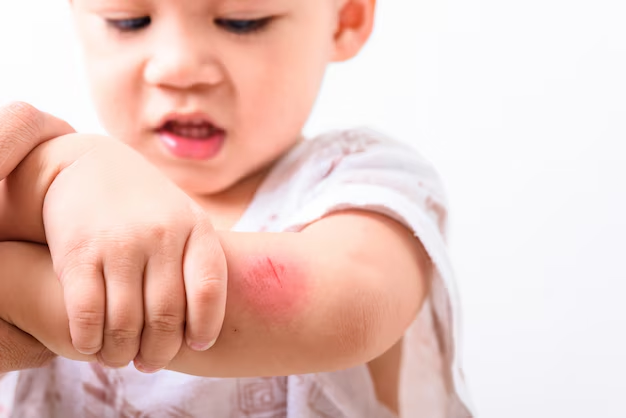Understanding Eczema: Can You Develop It Later in Life?
If you’ve ever experienced the uncomfortable itch and rash of eczema, you know it's more than just an irritation—it can significantly impact daily life. While eczema is often associated with childhood, many adults wonder if they can develop the condition later. Let’s unravel the facts about eczema, exploring its potential to develop at any age, and provide practical insights into managing and understanding this skin condition.
What Is Eczema?
Eczema, also known as atopic dermatitis, is a chronic inflammatory skin condition characterized by itchy, red, and dry patches. While eczema often manifests in childhood, it’s not confined to it. Eczema can occur in adults who have never shown symptoms before. Understanding the complexity of this condition requires diving deeper into its causes, symptoms, and management strategies.
Causes of Eczema
Genetic Factors
One of the primary reasons people develop eczema is genetics. If you have a family history of eczema, asthma, or hay fever, you are more likely to develop eczema. This genetic predisposition means the skin barrier functions differently, which can lead to a propensity for dryness and irritation.
Environmental Triggers
Eczema can also be triggered by environmental factors, such as:
- Allergens: Dust mites, pet dander, pollen, and molds.
- Irritants: Soaps, detergents, shampoos, and disinfectants.
- Climate: Extremely hot or cold weather, high humidity, and dry air.
- Diet: Certain foods can also trigger eczema flare-ups in susceptible individuals.
Stress and Immune System
Interestingly, stress and the immune system's overactive responses also play roles in eczema's manifestation. When the body is under stress, you may experience flare-ups or worsening of symptoms due to the immune system's heightened state.
Types of Eczema
Understanding the different forms of eczema can help in recognizing symptoms:
- Atopic Dermatitis: The most common form, often beginning in childhood.
- Contact Dermatitis: Triggered by contact with an irritant or allergen.
- Dyshidrotic Eczema: Characterized by small, itchy blisters on the hands and feet.
- Nummular Eczema: Appears as circular spots on the skin that can become itchy and scaly.
- Seborrheic Dermatitis: Affects oily areas like the scalp, face, and chest.
Recognizing Eczema Symptoms
Eczema symptoms can vary greatly from person to person. Typical signs include:
- Itching: Often severe and worse at night.
- Red Patches: Inflamed areas that may appear on the face, neck, hands, wrists, and feet.
- Dry, Sensitive Skin: Easily irritated and painful.
- Thickened, Scaly Skin: From repeated scratching.
- Blisters: May occasionally ooze or crust over.
Can Adults Develop Eczema?
Absolutely, adults can develop eczema even if they have no prior history. Several factors can contribute to this, including:
Changes in Environment
A significant change in living conditions or environment can lead to the development of eczema in adulthood. Moving to a different climate or exposure to new allergens can trigger symptoms.
Hormonal Changes
For some, hormonal shifts such as those during pregnancy, menopause, or due to thyroid conditions, can cause eczema to develop or flare up.
Immune System Alterations
As we age, changes in the immune system's functionality can lead to an increased risk of developing dermatological issues, including eczema.
Managing Eczema
While there’s no cure for eczema, several strategies can help manage symptoms effectively:
Skincare Routine
Develop a consistent skincare regimen that focuses on moisturizing. Use fragrance-free moisturizers to help maintain skin hydration and barrier function.
Stress Management
Incorporate stress-reduction techniques such as meditation, yoga, or exercise to prevent stress-induced flare-ups.
Dietary Considerations
Some individuals find that dietary changes can help manage symptoms. Identifying and eliminating foods that trigger flare-ups might provide relief.
Avoiding Triggers
Identify and avoid personal triggers, such as specific soaps, detergents, and other irritants, to reduce the incidence of eczema outbreaks.
Seeking Professional Guidance
Consulting healthcare providers can help in understanding individual triggers and developing a comprehensive management plan that can include topical treatments and other therapies.
Lifestyle and Eczema
Adopting a few lifestyle adjustments can aid in controlling eczema symptoms:
- Wear Breathable Fabrics: Opt for cotton or other natural fibers that allow the skin to breathe.
- Temperature Control: Keep your living environment stable in temperature and humidity.
- Regular Hydration: Drink plenty of fluids to aid skin hydration from within.
- Sleep Hygiene: Ensure adequate rest, as lack of sleep can exacerbate symptoms.
Eczema and Mental Health
Living with eczema can sometimes take a toll on mental well-being. It’s important to acknowledge and address the psychosocial aspects, such as the impact on self-esteem and any anxiety or depression related to flare-ups. Community support groups or counseling can provide emotional support and practical advice.
Eczema Myths Debunked
There are several misconceptions about eczema that deserve clarification:
- Contagiousness: Eczema is not contagious. You cannot "catch" it from another person.
- Hygiene: Eczema is not related to a lack of cleanliness or hygiene.
- Dietary Cure: While diet may play a role in managing symptoms, eczema cannot be cured solely through dietary changes.
Conclusion: Navigating Life with Eczema
Eczema is a lifelong condition that varies greatly in how it affects individuals. Understanding its causes, triggers, and management strategies is crucial in living comfortably and confidently despite the condition. If you suspect that you're developing symptoms related to eczema, maintaining open communication with healthcare professionals is invaluable. With the right knowledge and preparation, managing eczema’s challenges can become an integrated part of your lifestyle.
Eczema: Key Takeaways 📝
- Eczema can develop at any age due to genetic, environmental, and immune-related factors.
- Recognize symptoms: Itching, red patches, dry and sensitive skin.
- Manage through lifestyle: Moisturize, avoid triggers, manage stress.
- Seek support: Professional advice helps tailor personal care plans.
- Debunk myths: Eczema is not contagious or related to poor hygiene.
By navigating the complexities of eczema with informed understanding, you can take proactive steps to managing the condition effectively. 🌟

